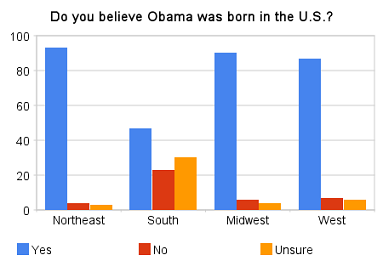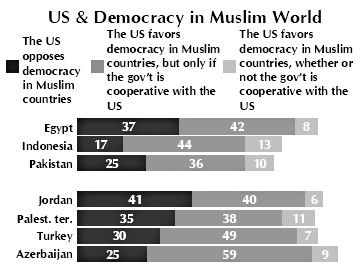
Found at Gin and Tacos.
—————————
Lisa Wade is a professor of sociology at Occidental College. You can follow her on Twitter and Facebook.

Found at Gin and Tacos.
—————————
Lisa Wade is a professor of sociology at Occidental College. You can follow her on Twitter and Facebook.
People in Muslim countries don’t think so:

(worldpublicopinion.org, via Kevin Drum at Mother Jones and Alas a Blog).
Many of the polls that we have been consuming voraciously have not included people without a land line (like me). In the figure below, we can see what a difference that makes in the results. Yellow bars are polls that included cell phones and grey bars are polls that did not. Those that excluded cell phones are significantly skewed towards McCain, and falsely so insofar as people without a landline vote.
From 538 via Thick Culture.
(From the New York Times)
This figure, part of this New York Times story, illustrates the percentage of people (grouped by age and sex) who think that it is likely a woman will be president in their lifetime:
I’ll admit, it makes me feel like a crotchety old cynic.
Jay Livingston over at Montclair Socioblog reports on a report by the Pew Center. First this image:
Jay writes:
When Reagan asked this question in the 1980 presidential debates, most people, according to Gallup felt that yes, they were better off – 52% vs. 25% who felt they were worse off. That’s puzzling, considering the apparent success of Reagan’s question – he won the election handily.
The interesting result from the Gallup numbers is that when Reagan left office – after the “Reagan recovery” cherished by anti-tax, anti-regulation conservatives – the numbers were identical. If you look at actual changes in median family income, you see a slight decline in the Carter years and an increase in the Reagan years. But these changes aren’t reflected in how people felt, at least not as measured by Gallup.
This year’s numbers show optimism at its lowest ebb since Gallup started asking the question in 1964. “Better off” still tops “worse off,” but by only 41% to 31%. Even more surprising to me was the proportion of these self-identified middle-class Americans who rate their quality of life as low (five or less on a ten-point scale).

At the Los Angeles Times, found via Scatterplot.